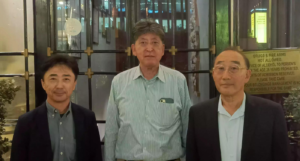In a pass to make bigger its global attain and introduce actual Japanese flavors to India, Chiba Shoyu Co., a famend Japanese soy sauce producer with over a hundred and fifty years of enjoy, has embarked on a pilot task in India. This innovative mission, supported with the aid of the Japan International Cooperation Agency (JICA), targets to set up a neighborhood production facility on the way to adhere to the same herbal soy sauce production procedures hired in Japan.
Through this collaborative effort, Chiba Shoyu Co. Has partnered with Avantika Sinha Bahl, the owner of Kampai, a well-established Japanese area of expertise eating place logo in India. Together, they goal to complement the neighborhood soy sauce panorama and its processed products with the aid of incorporating Japanese expertise and strategies. This pilot task has already taken a sizable leap forward, with the Indian accomplice efficiently manufacturing about 2,000 liters of soy sauce beneath managed situations at their facility in Gurugram.
Speaking on the release occasion held in New Delhi, Kyosuke Iida, the president of Chiba Shoyu Co., expressed the business enterprise’s goal to affirm and ascertain whether or not replicating their herbal soy sauce manufacturing techniques is possible in India. He highlighted that presently, no manufacturer in India produces herbal soy sauce, making this project a pioneering enterprise.
Recognizing the growing call for for wholesome and natural food alternatives in India, Iida emphasized that the time is ripe for Chiba Shoyu Co. To explore worldwide markets like India. He similarly noted the increasing reputation of Japanese and Chinese cuisines in India, in addition fueling the demand for true soy sauce.
While soy sauce consumption in Japan is drawing near saturation, Iida careworn the importance for manufacturers to discover global markets wherein demand for herbal and natural merchandise is on the rise. He expressed his pride with the partnership with Avantika Sinha Bahl, who possesses a deep expertise of soy sauce and can distinguish between true soy sauce produced through natural approaches and mass-produced counterparts.
Iida also acknowledged the abundance of soybeans, wheat, and salt, the important thing elements in soy sauce manufacturing, in India. Establishing production centers would not only generate call for for those agricultural products however also create employment opportunities inside the nearby marketplace.
Outlining the future plans, Iida stated that Chiba Shoyu Co. Will serve as the technical companion during the venture. If the pilot proves successful, the Indian companion will assume responsibility for branding and advertising strategies.

Ryoichi Sasho, CEO of Going Green Inc, the venture facilitator, expressed his belief that this initiative will bolster the efforts of Japanese government agencies, along with the Japanese embassy, in promoting Japanese cuisines in India.
Sharing her enthusiasm for the mission, Avantika Sinha Bahl stated, I am thrilled to be partnering with Chiba Shoyu as we embark in this groundbreaking pilot task, supported with the aid of JICA, to deliver the real flavor of soy sauce to India. Our aim is to create a taste that seamlessly blends lifestyle and innovation, transcending borders.
The pilot challenge undertaken via Chiba Shoyu Co. Marks a great breakthrough in introducing authentic Japanese soy sauce to India. With its recognition on herbal manufacturing methods and the know-how of its Japanese companions, this assignment has the potential to revolutionize the soy sauce panorama in India and introduce a new measurement of culinary excellence to Indian cuisine.
Potential Advantages
The expanded availability of natural soy sauce in India has led to activity advent, improved demand for soybeans, wheat, and salt for Japanese farmers, and the introduction of true Japanese flavors in Indian cuisine.
Potential Disadvantages
Replicating Japan’s natural soy sauce production methods in India presents challenges due to weather, elements, and manufacturing tactics. Competing with Indian soy sauce producers at lower charges is likewise challenging. Consumers may choose industrially synthetic soy sauce, and there is a restrained marketplace for natural soy sauce in India compared to Japan.
Overall, the pilot challenge has the potential to carry huge blessings to both Japan and India. However, it is important to carefully recollect the capability demanding situations and develop strategies to mitigate them. The fulfillment of the venture will depend on the ability of the partners to overcome these challenges and establish a sustainable enterprise version for the production and distribution of herbal soy sauce in India.

























